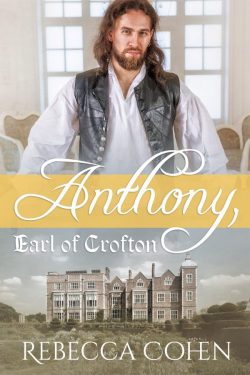A Novel in Three Acts
by
A romantically queer Edwardian novel in three acts.
Six unconventional people find their unconventionally-perfect matches in a community of adventurers and academics.
An American heiress travels to England in 1905, soon to meet an aristocratic lady adventurer who becomes the friend and partner of a lifetime …
An Oxford solicitor finds himself possessed of a modest estate, yet has no one with whom to share it. Seeking a lady of intelligence, he finds his perfect match …
A gemstone magnate from Ceylon forms a connection with the Spanish secretary to an English duchess. The time may be right for their love; the place is not. But in the south of France they can live together in the sun …
A sweet, low-angst, ensemble frolic. Adult situations, themes, and language, with three happy endings.
- 1 To Be Read list
Publisher: Independently Published
Genres:
Pairings: F-F, M-F, M-M
Heat Level: 2
Romantic Content: 4
Ending: Click here to reveal
Character Identities: Bisexual, Gay, Lesbian, Pansexual, Polyamorous, Straight
Protagonist 1 Age: 26-35
Protagonist 2 Age: 26-35
Protagonist 3 Age: 36-45
Tropes: Everyone is Queer
Word Count: 55,700
Setting: England
Languages Available: English
OVERTURE
In which we meet Our Actors
On a Rainy Day in 1905
Elizabeth Bonner
Our rooms at the hotel were sufficiently commodious that we might all have been quite private. After the long and tedious ocean crossing, packed into one stateroom and two small cabins, one might have thought we’d want time to ourselves. Instead we huddled together on the bed in my room, determinedly not looking out the window at a gray and rainy early-summer day in London.
“I will ask you again, from time to time,” I said. A glance to my right at my steward Marius; one to my left at my dresser Daisy. “If on due consideration you abhor the Old World, I shall send you back to New York. Or wherever you like.”
“Never again,” Marius said, with feeling. “The Atlantic may heave without me.”
READ MOREDaisy snickered. “You know all our friends are dying to hear of our great adventure. And they all say, give it a year.”
Mine – the few true friends I’d left behind, rather than bringing with me – had said the same. England is different, they said; no one will know you there. As if that were a bad thing.
“At least we know already that one thing was true,” I said after a moment. “The city is as diverse as New York. No one will look twice at you.”
“They’ll look twice at you, once they know your man of business is black.”
Daisy reached across me to pat Marius. “And me.”
I made an irritated noise. “I am confident that the people with whom I would choose to be friends will think nothing of it.” And oh, how exciting that thought was. I’d crossed the ocean for many reasons; chief among them was to meet someone. All was possibility, and nothing was at stake. I would stay regardless of the outcome, freed by distance from the oversight of my remaining family and the stifling rules of my youth.
Suddenly restless, I kissed Daisy, then Marius. “Up and away, my loves. Let’s ring for –”
“Coffee,” they said together.
George Fairchild
I poked my head into the library, saw my secretary Inigo where I expected him, and said, “Tea?”
“Gracias,” he said absently, attention remaining on the papers before him. Apparently he was in a Spanish mood. That suited me; the day was gray, wet, and chill; to be reminded of more Southern climes was no hardship.
“In the conservatory?”
He looked up then, smiling at me. “Have you turned on the radiator?”
“Naturally. Meet me there?”
“I’ll be along shortly, Duchess.”
I clicked my tongue at him in mock reproof. After all these years, and especially now that my title was a simple artifact, for him to use it was mere habit. Then I left him, found one of my plentiful staff and gave my order, and wandered off to my conservatory.
This house was my haven, my refuge, and on some days my prison. The late Duke Alfred and I had lived here most of the time when we were in England, though the family seat lay elsewhere. It was far enough distant from the rest of the family that we could be private, near enough to Oxford that we could be on a train within hours at need.
Privacy is a ruling principle when your household is arranged for the comfort of an inverted Duke, his thirty-years-younger and Platonically-devoted bride, and his longtime lover. Neither Inigo nor I would ever stop missing Freddy. At least I’d had a companion the past several years.
I missed Caroline with particular intensity that day. I’d been reading an account, from America, of developments in powered flight. Having traveled (I use the term loosely) by balloon (a chancy and little-controllable endeavor) on several occasions, the prospect of being able to steer one’s vehicle aloft, and choose one’s landing site, gave me some exciting ideas. She’d been with me for one of those balloon ascensions. I had no doubt that she’d’ve stood by smiling, though stoically anticipating my imminent fiery demise, as I attempted one of the new machines.
It was too soon to seek a new companion; not too soon to wish for one. England had felt too small for me for years, and I longed to leave it again, but not alone. “There will be someone,” I said under my breath, then filled my lungs with the warm, steamy, fragrant air of the conservatory. The orange trees were blooming.
Donald Richards
“This is the sort of day when one prefers Oxford,” I told my friend Walpole as we trudged down the mucky London pavement. We were crowded under his umbrella, jostling our way from his house to the nearest pub.
He gave me a sideways look. “No doubt it’s raining there as well.”
Ah, but in Oxford I’d be alone and thus free to stay indoors. Brew a pot of tea over my spirit lamp, turn up the reading lamp, drape a blanket around my shoulders, and lose myself in a book. “How goes your practice these days?”
“Well.” He stood back as I pulled open the pub door, then we lurched inside. His umbrella joined the mob dripping in the vestibule, and we turned toward the taproom. “I’ve acquired a new client with interests in Wales,” he added as we found a table.
“Ooh! Will you travel there?”
“Very shortly. Have you been?”
“Two summers ago, for a ramble in Snowdonia.” Shortly after his wedding, though I did not say so. I’d already heard enough about that, about his wedding trip to Brighton, about settling into the terraced house in Camden. Envy did not suit me. I turned my gaze to the slate above the bar. “Oh my oath, they’ve pork pie and cream o’ leek soup.”
“I’ll have it,” he said, as pleased as I was. Walpole’s wife was away this weekend, so we were obliged to feed ourselves. It was not, strictly speaking, a cold day, but leek soup suited every weather, and a pint or two in a pub always went down well with a slab of pie. “Margaret was sorry to miss you.”
That might’ve been true; we all got on. “She’s well, I trust?”
“Very well.” Now would be the time for him to tell me if they were expecting a child; since he said nothing more, I deduced that they were not. Yet. He changed the subject, in any case, to the much-discussed new Aliens Act. Neither of us had any good to say of it; we had Jewish friends in common. Royal assent seemed a certainty, which meant those friends and their families would be made to feel even less like valued citizens. We cheerfully abused the Act and its perpetrators through the first pint and the pie.
At length, the subject changed to my practice. “I’ll never be rich,” I said, “but I’m my own man.”
“Good feeling, eh?” I nodded. Walpole sat back and eyed me. “D’you think you might marry?”
Oh damn the man, why must he ask? It was so unlikely that I’d achieve the necessary security in time to make good use of it. I shrugged, affecting disinterest. “Perhaps I’ll acquire a particularly profitable client soon, and the means to house a wife as handsomely as you.” He looked pleased at that. I changed the subject again.
Aurelia Dashwood
It was another tedious day of pretending to find my young charge’s wardrobe a topic of fascination. She was an appealing-enough young person, but with a Season at last in her sights her attention to my areas of expertise had waned. She’d put up her hair last winter; in the next few months, she would make occasional forays to carefully-selected and scrupulously-supervised social events. I was aware, though not yet on notice, that as of next spring, my services as governess would no longer be required.
In the meantime, I had a pleasant place to live; a summer in the country to enjoy; and a winter of mostly-congenial activity to anticipate. It was no true hardship to accompany a fledgling as she stretched her wings. I might even secure my next post before the end of this one.
A governess is neither fish nor fowl, but I’d acquired a certain expertise in negotiating my place in a house. Thus I was present when the servants convened in the kitchen for tea. Amidst the rambling chatter, the senior footman nodded at me and asked, “What do you do between posts?”
“I’ve options,” I said briskly. “I could go home to my parents. Or I could take lodgings in any city with an employment agency.”
“Why would you not go home?”
This from a curious housemaid. I turned to smile at her. “My father’s a vicar with a living not far from Brighton. It’s a holiday town, and the sort of people who might hire a governess only go there on holiday. I was in London when I secured this post, and my first. The others came by referral.”
“What about marriage?” That impertinent question was from the under-footman, several years my junior and a bit of a flirt.
I smiled at him too, concealing the twinge the question cost me. Under no circumstances would I tell these people – friendly, but not my true friends – my whole history. “That is, my dear Wallace, another argument in favor of London.”
Cook snorted out a laugh, which reminded us all that she’d met her spouse in the great City. “You can find anything in London,” she said, tipping me the wink.
Let it be so, I thought, and raised my cup to her.
Severin LaSalle
I supervised the transfer of my luggage to a sturdy coach, then turned for one last look at the ship. The cabin steward who’d enlivened several of my nights on board was nowhere in sight. We’d said our goodbyes the day before, in a friendly manner that did not preclude my offering a hearty tip. He had, after all, kept my cabin in good order throughout the voyage from Ceylon.
The day was not conducive to bright expectations. After four and a half decades in the tropics, I was well used to rain; but my rain came in sheets, followed by hot sun to steam off the wet. This rain drizzled, dashing under my hat brim and my jacket with each gust of chill wind off the Thames, promising that I should be permanently cold here. I cast one more assessing glance over the load, then hauled my shivering self up into the coach.
Bright expectations or not, I had much business to transact here in England. My relations (most notably a Marquess based in Yorkshire) would soon see my face for the first time. It was, in fact, the first time any of my branch of the family had come to England since my ancestor left it over a hundred years before. Before he died, my father told me I should come. “I might have gone,” he said. “Might’ve applied to have the title restored. You might be a baronet after me.”
I’d stared at him, saying nothing; after a moment, we’d both burst out laughing. What did we want with an English title?
Our family’s history was a matter of hundreds of pages of parchment, laboriously kept, expanded by each LaSalle when something of particular note occurred. I brought with me a clean copy; one of my aims was to arrange for its publication.
The name would die with me. Before that happened, I hoped to change my life. If all went well with my cousin, management of the estate would pass to my sister, and thence to her children. I would be free.
For a man of my age, who might reasonably be looking forward to retirement from decades of work, to be wishing rather to start over might be odd. My education and my business experience could open new doors for me, if I made the right friends here or on the Continent.
To also make the sort of friends who’d enliven my leisure was a wish that might not come to fruition. I would have less freedom for such things here. At best I might find temporary solace.
In, all the gods willing, a warm room.
Inigo Salazar
I joined Fairchild in the conservatory, tugging at my cravat to loosen it. She’d told me a hundred times that I need not dress formally at home, but after a half-century I had the habit of it. A suit and tie were, in a sense, my armor: a reminder that while she was my friend, she was also my employer, and that this was my home only by her gift.
“You are pensive today,” I remarked after we’d made inroads on our first cups of tea. “Something troubling you?”
“Not to say troubled. I was reading about the Wright brothers in America and their mad venture with motorized aircraft.”
“Oh, God, and I suppose you want one. I’m constantly amazed you haven’t acquired a motorcar.” She laughed. I smiled into my teacup. Sipped again, then set it aside and reached for a biscuit. Raised my eyebrows at her.
She sighed. “I’m restless.”
“Of course you are.”
“This time of year, I’m usually planning an adventure. Or at least an excursion. But since Caroline.” Her voice trailed off.
I reached over to pat her arm. “A few more months. Then no one will make a scene if you begin living a full life again.” Mourning needn’t last forever, though in my case I often wondered if it would. Where would I ever find someone to fill the hole left in my heart by losing Freddy? Did I even want to? I dismissed the thought. “To the world, she was only your companion.”
Fairchild sniffed dismissively. Ate a biscuit, drank some tea, then leaned back in her rattan chair and tipped her head up. The palm tree towering above us was quivering in the faint breeze drifting through an open casement. Some local birds (the reason for the open casement) had a nest in a crevice where an old petiole had been cut away. “D’you suppose they find mates more easily because their lives are short?”
A philosophical question, to which I returned a provocative answer. “Because they have no religion.”
She laughed again, sprawling in the chair, expression lighter than I’d seen it in months. “Ah, God, Inigo. What would I do without you.”
“The question is not likely to arise,” I said with composure, freshening my cup. Making eye contact as she straightened, wordlessly communicating two facts: I had already more joy in life than most men of my sort could even imagine; she was now the person who knew me best, and loved me best, in all the world.
I could not wish for more.
SEXTETTE:
The Emerald Boa
Featuring an American Coquette, an Aristocratic Lady, and A Stolen Artifact;
The Blue Dragon
Featuring an Unexpected Heir, A Lady of Intelligence,
And A Chimera;
The Scarlet Knife
Featuring a Noble Spaniard, a Sapphire Magnate, and a Private Arrangement;
Lavender Fields
A Coda, featuring a Cat, a Goat, and Numerous Bees
COLLAPSESEXTETTE features three separate love stories (F/F, M/F, and M/M) in a diverse group of free-thinking friends based in Oxford. The second edition was released November 30, 2024.





